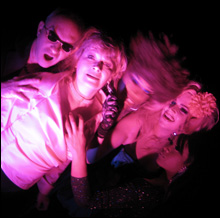
Island of Slaves
|
When Pierre Marivaux’s play Island of Slaves was presented at Versailles in 1725, Louis XV and his retinue were not amused, and it’s no wonder. Although the play was comic in tone and the action set on an island off the coast of Athens, far from France, the aristocracy must have cringed at a plot calling for a power reversal between the ruling class and its servants. Marivaux imagined an island democracy established by runaway slaves, in which everyone was equal. When two masters and their servants are shipwrecked there, the inhabitants determine to convert the newcomers by forcing them to swap clothing and roles. American Repertory Theatre artistic director Robert Woodruff, who’s staging a modern-dress revival of the work, and Gideon Lester, its translator, are convinced of the play’s relevance for modern audiences. Woodruff asks, “Do we not aspire anymore for Utopia? What is freedom? And what are the responsibilities of power?” He believes that, with the fall of the Berlin Wall and the crumbling of Communism, “the idea of Utopia was dropped from the lexicon.”
“Marivaux wrote 50 years before the French Revolution, but the seeds were there,” Lester adds. “He’s a strange beast, delicate and subtle. His plays can be comedy and tragedy. It’s pretty amazing that he put these ideas on the table.”
Woodruff sets his production in a faded nightclub called Utopia. “Yeah, in America,” he admits. ART regulars Remo Airaldi, Karen MacDonald, Thomas Derrah, and John Campion are joined by a quintet of young, Boston-based drag performers who work under the stage names Mahogoney Brown, Fena Barbitall, Raquel Blake, JuJu Bee, and Landa Plenty. They portray the island’s citizens. “We’ve been playing with the mediæval idea of degradation, rebirth, and role reversal during festivals or carnival,” Woodruff says. “The drag queens are a subculture that’s on the fringe. The Boston drag scene is one of the most articulated in the country.” To reinforce the connection between role playing and Marivaux’s work, they’ll fill one wall of the rehearsal studio at Zero Arrow Theatre with photos of drag performers in fantastic regalia.
In keeping with the roots of the play, which was written for a commedia dell’arte troupe based in Paris, Lester’s script is a skeleton ready to be fleshed out by song, dance, and improvisation. “The play is meant to be performed as a musical,” he says, karaoke-style, its tunes lip-synched to records. Woodruff adds, “We’ve got the tallest performers, seven feet from the top of the wig to the floor, and the highest heels in Boston. We’re also channeling the spirit of Noël Coward. The whole play is an homage to spring. This is a party show that has something serious at the heart of it. There are no limits — for a day.”
Island of Slaves | May 13-June 11 | American Repertory Theatre | Loeb Drama Center, 64 Brattle St, Cambridge | $15-$74 | 617.547.8300 or www.amrep.org